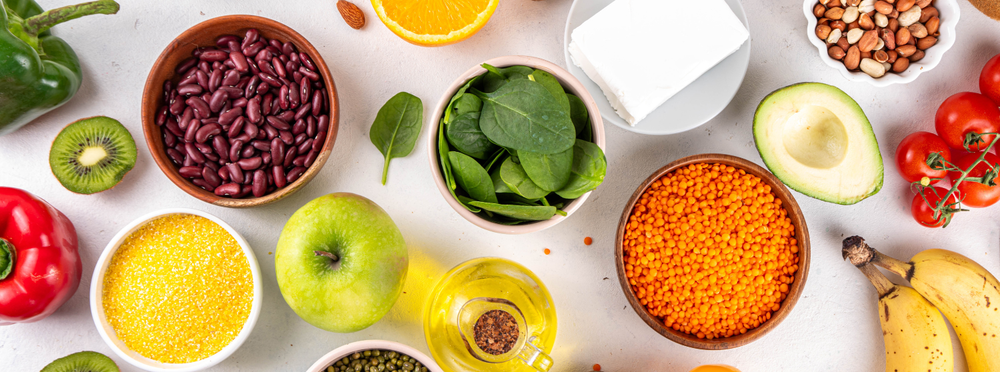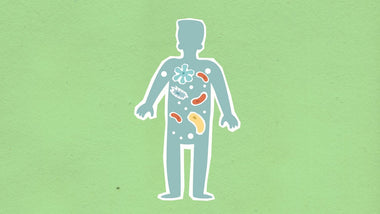Everything You Need to Know About Plant Sterols and Cholesterol

If you’re focused on lowering your cholesterol without relying solely on medications, there’s a good chance you’ve come across the term “plant sterols.” These natural compounds are backed by science, recommended by health authorities, and built into every serving of Step One Foods. But what exactly are plant sterols, how do they work, and should everyone use them?
Here’s a complete breakdown of what you need to know.
What Are Plant Sterols?
Plant sterols, also called phytosterols, are natural substances found in all plant-based foods. They serve a similar purpose in plants as cholesterol does in humans—contributing to cell structure. Though they closely resemble human cholesterol in molecular structure, they behave very differently in the body.
When consumed, plant sterols compete with cholesterol (both dietary and bile-derived) for absorption in the intestines. Because the body absorbs plant sterols poorly, they effectively block the absorption of cholesterol, reducing how much cholesterol enters the bloodstream.
How Do Plant Sterols Lower Cholesterol?
The process is two-fold:
-
Blocking dietary cholesterol absorption: Plant sterols compete with cholesterol from food for absorption, reducing how much of it ends up in your bloodstream.
-
Reducing bile cholesterol re-absorption: Every time we eat, our liver (and gallbladder if you have one) release bile into the digestive tract to help break down food. Bile is rich in cholesterol, and we use circulating LDL cholesterol to make it. This creates a natural elimination pathway for LDL as bile gets used up in the digestive process. Unfortunately, any bile not used up during digestion gets reabsorbed, reducing the stimulus to use circulating LDL to make more bile for the next meal. Plant sterols help reduce this reabsorption process, causing the body to pull cholesterol from the bloodstream to make more bile, ultimately lowering circulating LDL levels.
For best results, plant sterols should be consumed with food. This ensures bile is present in the digestive system, maximizing the cholesterol-lowering benefits of these compounds. After all, plant sterols can only compete with bile for absorption if bile is around to be competed against.
How Much Plant Sterols Do You Need?
To achieve clinically meaningful cholesterol reductions, research shows that around 2 grams of plant sterols per day are needed, ideally delivered in divided doses. That’s why every serving of Step One Foods includes at least 1 gram of plant sterols. Two servings per day help you hit that 2-gram target, spacing out intake naturally.
Best Food Sources of Plant Sterols
Plant sterols are naturally found in nuts, seeds, oats, legumes, and vegetable oils. However, it’s difficult to get enough for meaningful cholesterol lowering through diet alone. That’s why certain products, including those from Step One Foods, are fortified with natural plant sterols to help you meet daily intake goals.
Are Plant Sterols Safe?
Plant sterols are extensively studied and are recognized for their ability to lower LDL cholesterol safely and effectively. They are recommended by the American College of Cardiology and the National Lipid Association, particularly for people who need additional cholesterol-lowering support beyond medications.
However, if you go online, you may run across articles that show that plant sterols can make their way into the bloodstream and that because they are a form of cholesterol they could contribute to plaque formation. The most obvious argument against these concerns is that whole food vegans and vegetarians,- who naturally display the highest circulating plant sterol levels among us, also happen to experience the lowest rates of heart disease and heart events.
Studies have shown a 35% increase in circulating phytosterol levels related to consuming phytosterol supplements and/or phytosterol-enriched foods. However, this increase represents a very small absolute uptick because circulating levels of plant sterols are very low to begin with. All to say that for phytosterols to pose a significant risk, they would not only need to be 20-40 times more toxic than LDL cholesterol, but their levels would also need to be linearly related to risk, both of which are highly unlikely. Especially given the overwhelmingly positive outcome data surrounding consuming a plant-rich (and therefore plant sterol-rich) diet.
The linear risk assumption is especially problematic. In biologic systems, risk is almost never linear. Instead, it is typically determined by thresholds. Here’s a good way to think about this: if a train containing 500 people crashes while traveling at 100 miles per hour and all 500 people die, it is not a given that 5 people will die if that same train crashes while traveling at 1 mile per hour.
What About Sitosterolemia?
There is a rare genetic condition called sitosterolemia (also known as phytosterolemia) where the body absorbs plant sterols indiscriminately. Sitosterolemia is so rare that only about 110 case reports have ever been published about it worldwide. Estimates have run as high as 1/50,000 people being affected, but to put that in perspective, you’d be 3 times more likely to get struck by lightning during your lifetime than to have this condition.
The indiscriminate phytosterol absorption leads to very high sterol levels in the blood and deposits of phytosterols EVERYWHERE including tissues like tendons, the tissues around the eyes - and blood vessel walls. Plant sterol deposits can also cause joint stiffness and pain, and even affect platelet formation, leading to low platelet counts and abnormal platelet appearance. From a cardiac perspective, a big clue that you might have this condition is a very high coronary artery calcium score that’s not easily explained by other risk markers.
When sitosterolemia is suspected, a blood sitosterol level can be used to make the diagnosis. Patients with sitosterolemia often have sitosterol levels in the range of 100 to 650 mg/L (normal range being 1.7 to 3 mg/L). Going back to the 35% increase in circulating phytosterol levels with supplements or phytosterol-enriched foods, you might get to levels in the 2.3 to 4.1 mg/L range. That's a far cry from typical sitosterolemia levels.
Should You Be Concerned About Modestly Elevated Sterol Levels?
What about sitosterol blood levels that fall naturally above 3 mg/L but are not sky high? It's important to understand that mild sitosterol elevations do not automatically indicate a plant sterol threat. Sitosterol blood levels are actually a surrogate marker for how avidly we absorb cholesterol through the intestinal tract. So higher sitosterol levels simply mean you are an efficient cholesterol absorber, which also means you may benefit more from dietary changes or specific medications like ezetimibe that block cholesterol absorption - and less from medications like statins that target cholesterol production. (As a side note, ezetimibe is the first line treatment for people with sitosterolemia).
Can Plant Sterols Be Found in Plaque in People Without Sitosterolemia?
I suspect that if we looked hard enough, we would find some plant sterols in every plaque analyzed. Yes, intestinal cells are supposed to block plant sterol absorption and spit every plant sterol they accidentally absorb back out into the digestive tract, but no system is fool proof. However, just because you can see a plant sterol molecule in plaque is not a reason to panic. Just like calcium in heart arteries is not the problem but a marker of the problem, plant sterols in plaque is not the problem – the fact that you have plaque in the first place is the problem!
Are There Any Side Effects?
Plant sterols may slightly reduce the absorption of fat-soluble vitamins and carotenoids. This effect is minimal and can be offset by eating more fruits and vegetables—especially those rich in beta-carotene like carrots, sweet potatoes, and leafy greens.
Additionally, due to the lack of research in certain populations, plant sterol supplements are not recommended for infants or pregnant/breastfeeding women. However, eating foods naturally high in plant sterols—like nuts, seeds, and vegetables—is still encouraged during all life stages.
The Bottom Line
Given the favorable safety data, the extremely low likelihood of negative effects, as well as proven efficacy at helping lower cholesterol, plant sterols are a very useful adjunct to cholesterol lowering attempts. It’s no wonder the American College of Cardiology and the National Lipid Association have both called for the increased consumption of these compounds in people with high cholesterol, especially those not at goal despite maximum tolerated statin doses.
Step One Foods makes it easy to get clinically effective doses of plant sterols every day. With products that deliver real food and real results, you can take meaningful steps toward lowering your cholesterol and protecting your heart—without relying solely on medication.
About Step One Foods: Step One Foods offers convenient, scientifically-formulated foods clinically validated to rapidly reduce cholesterol and improve cardiometabolic health. Real food. Real results. Unapologetically delicious. Learn more at steponefoods.com.

Tested & Proven Results.
- Cardiologist formulated
- Supported by over 500 publications
- Clinically-proven, in a double-blind randomized trial with Mayo Clinic and The University of Manitoba
80% of participants lowered their cholesterol in just 30 days. With just two servings per day, Step One Foods offers a proven-effective way to naturally lower LDL (bad) cholesterol.
Get heart health tips and articles like this, delivered right to your email.
New articles every week.
You may also like...

The Most Misunderstood Heart Number (Plus Your Tune-Up Checklist)

Why Two People Can Eat the Same Calories—and Only One Gains Weight

You don’t need to avoid foods with cholesterol…except for these


